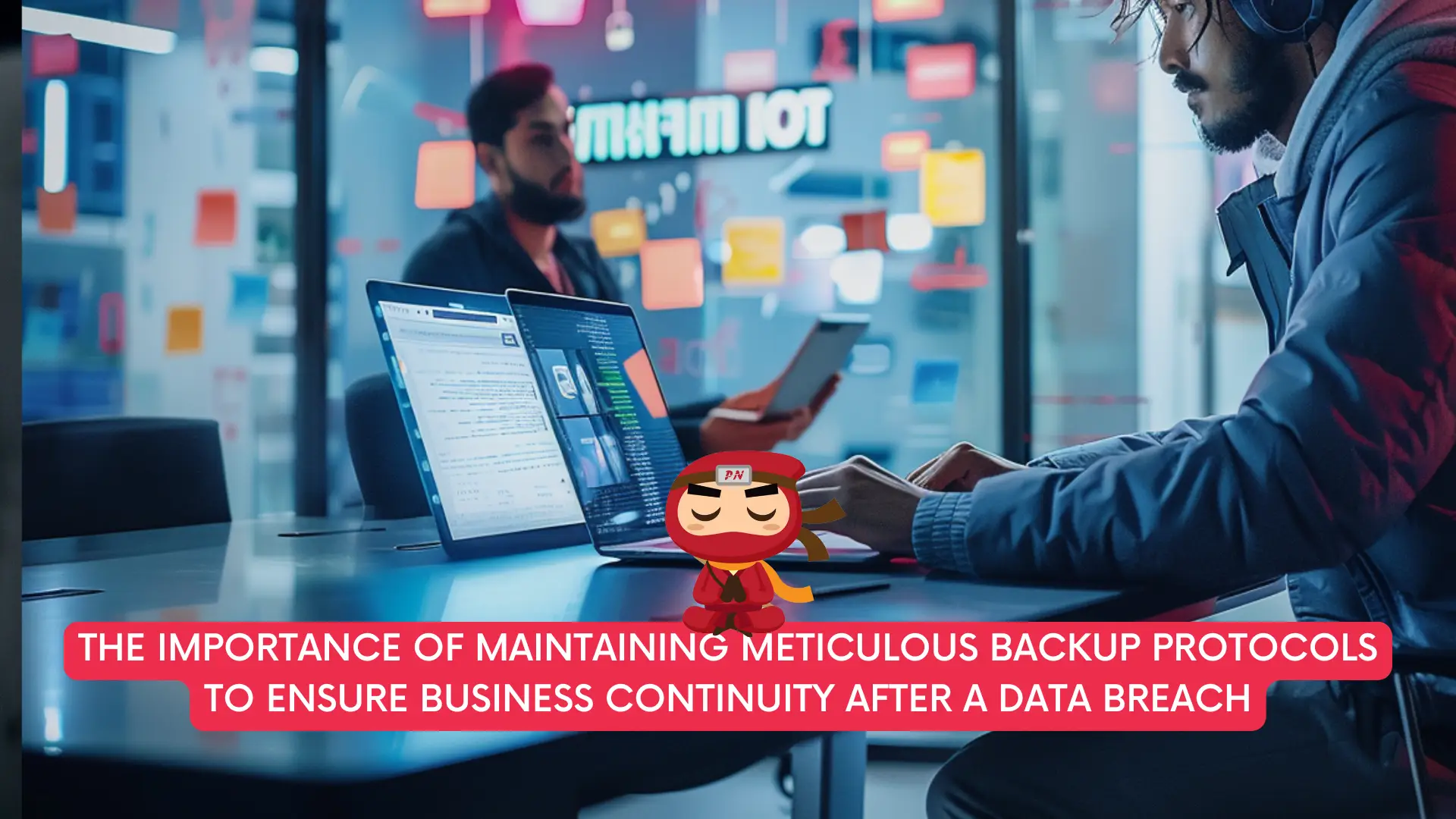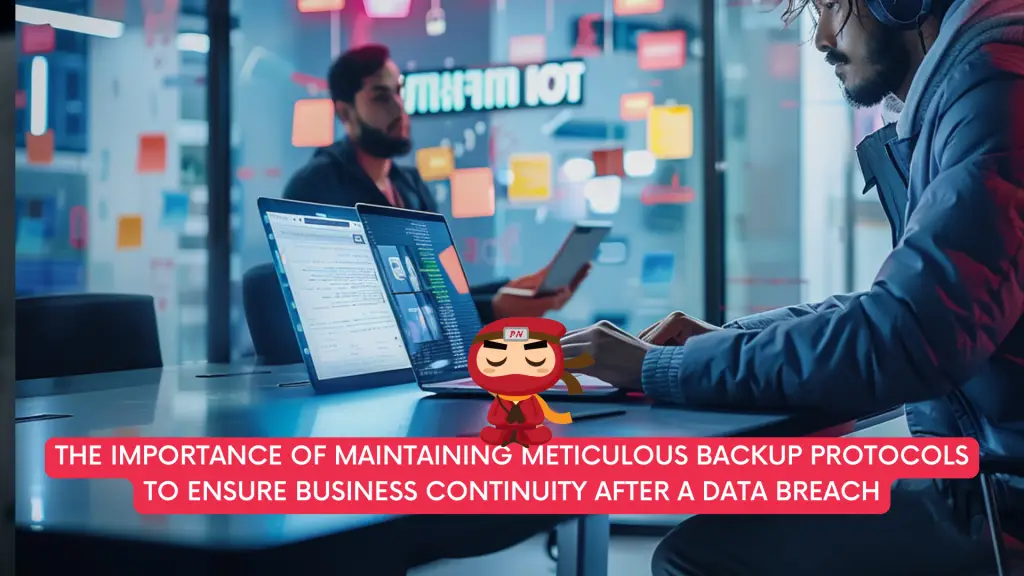KEEP IN TOUCH
Subscribe to our mailing list to get free tips on Data Protection and Cybersecurity updates weekly!







Businesses rely heavily on their data to operate efficiently and make informed decisions. From customer records to financial reports and intellectual property, data forms the backbone of modern organizations. Unfortunately, with the increasing frequency and sophistication of cyberattacks, data breaches have become a significant threat to business continuity. While companies invest heavily in cybersecurity measures to prevent breaches, there’s always the possibility that an attack could bypass defenses and compromise sensitive information. This is where having meticulous backup protocols becomes indispensable. Timely and thorough backups serve as a critical safety net, ensuring that organizations can recover from data breaches and other catastrophic events, and continue their operations with minimal disruption. This article explores the importance of maintaining robust backup protocols and how they contribute to business continuity in the event of a breach.
Data is at the heart of nearly every business operation today. It drives decision-making, customer interactions, product development, and more. From customer databases to proprietary software and financial records, businesses store vast amounts of sensitive data that are critical to their success. As such, losing access to this data—whether through a breach, hardware failure, or natural disaster—can be devastating. In fact, according to a study by the Ponemon Institute, the average cost of a data breach in 2023 was estimated at $4.45 million, highlighting the immense financial impact such an event can have on organizations.
As organizations increasingly rely on cloud storage, remote working solutions, and digital platforms, they are becoming more vulnerable to cyber threats. Ransomware, for instance, has become a prevalent attack vector, where malicious actors lock up critical data and demand a ransom to restore access. In such cases, having comprehensive backup protocols in place is crucial to ensuring business continuity and minimizing operational disruptions.

The primary reason for maintaining robust backup protocols is to have a reliable safety net in place in case of a cyberattack, particularly in the event of a data breach or ransomware attack. Cybercriminals are becoming increasingly sophisticated, often targeting businesses with ransomware that locks critical data and renders it inaccessible until the victim pays a ransom. In these scenarios, organizations that have regular, secure backups can restore their systems and data without succumbing to the attacker’s demands.
Backup systems provide an essential layer of defense, ensuring that data can be quickly recovered without significant financial or operational losses. Regularly backing up data and ensuring that backups are securely stored, whether on local servers or in the cloud, can be a lifesaver in the event of a cyberattack.
In the event of a data breach or system failure, downtime can have a devastating impact on an organization’s productivity. Employees may be unable to access critical systems, and customers may experience service disruptions. According to the Aberdeen Group, the average cost of downtime for organizations is approximately $5,600 per minute. Given the increasing reliance on digital tools and platforms, even a few hours of downtime can result in substantial financial losses.
By maintaining a well-established backup protocol, organizations can minimize downtime. Restoring data from backups can significantly reduce the time required to get systems back online. This allows employees to continue working with minimal disruption, and services can be restored to customers more quickly.
Organizations are increasingly subject to data protection regulations, such as the General Data Protection Regulation (GDPR) in the European Union, and the Personal Data Protection Act (PDPA) in Singapore. These regulations require businesses to take appropriate measures to protect personal data, including ensuring its availability and integrity. In the event of a data breach or loss, organizations must be able to demonstrate that they have taken steps to protect data and can restore it promptly.
Backup protocols are an essential component of ensuring compliance with these regulations. Not only do backups help prevent data loss, but they also ensure that data is available for recovery in case of a breach. Failing to implement adequate backup protocols can lead to severe penalties and damage to an organization’s reputation.
Data breaches are often caused by malicious actors, but human error and system failures also pose significant threats. Employees might accidentally delete important files, misconfigure systems, or fall victim to phishing attacks, leading to unintentional data loss. Additionally, hardware failures, such as hard drive crashes or server malfunctions, can cause widespread data loss that can disrupt business operations.
Having meticulous backup protocols in place helps organizations recover from these incidents. Regular backups ensure that critical data is preserved, even when human error or system failures occur. In fact, human error is one of the leading causes of data loss, and organizations that do not back up their data are at a higher risk of irretrievable loss in the event of such mistakes.

While cyberattacks and system failures are prominent concerns, natural disasters like fires, floods, and earthquakes can also jeopardize data availability. Physical damage to office spaces, data centers, or local servers can result in the loss of valuable business information. In these situations, off-site backups—either in the cloud or in remote data centers—can provide a critical safety net, ensuring that data is protected from physical damage and can be restored when needed.
Cloud-based backup solutions are particularly useful in this regard, as they ensure data is stored in geographically dispersed locations. This way, even if one location is affected by a natural disaster, data remains intact and accessible from another backup site.
Best Practices for Effective Backup Protocols
To ensure the effectiveness of backup protocols, organizations must adhere to best practices that guarantee data availability, security, and integrity. Here are some key guidelines for maintaining robust backup protocols:

Maintaining meticulous backup protocols is essential for organizations to ensure business continuity in the face of cyberattacks, system failures, or natural disasters. Timely and thorough backups serve as a safety net, allowing businesses to recover critical data and resume operations with minimal disruption. Organizations that prioritize backup protocols not only protect themselves from financial losses and reputational damage but also ensure compliance with data protection regulations. As cyber threats continue to evolve, having a solid backup strategy in place is no longer optional; it’s a necessity. By implementing best practices, such as regular backups, off-site storage, and encryption, organizations can ensure that their data remains secure and recoverable, no matter the circumstances.
Your appointed DPO can work with you on your PDPA compliance, ensuring that there will be policies in place to make sure that the handling of personal data is PDPA compliant.
A Data Protection Officer (DPO) oversees data protection responsibilities and ensures that organisations comply with the Personal Data Protection Act (PDPA). Furthermore, every Organisation’s DPO should be able to curb any instances of PDPA noncompliance as it is the officer responsible for maintaining the positive posture of an organisation’s cybersecurity.
DPOs complement organisations’ efforts to ensure that the organisation’s methods of collecting personal data comply with the PDPA. It also ensures that policies are set in place to make sure that there will be no instances of data breaches in the future.
Don’t wait any longer to ensure your organisation is PDPA compliant. Take our free 3-minute PDPA Compliance Self-audit checklist now, the same “secret weapon” used by our clients to keep them on track. Upon completion, we will send you the results so you can take the necessary action to protect your customers’ data. Complete the free assessment checklist today and take the first step towards protecting your customers’ personal data.